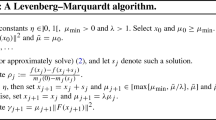Abstract
In this paper, we investigate a global complexity bound of the Levenberg-Marquardt method (LMM) for the nonlinear least squares problem. The global complexity bound for an iterative method solving unconstrained minimization of φ is an upper bound to the number of iterations required to get an approximate solution, such that ‖∇φ(x)‖≤ε. We show that the global complexity bound of the LMM is O(ε −2).
Similar content being viewed by others
References
Bertsekas, D.P.: Nonlinear Programming. Athena Scientific, New York (1995)
Moré, J.J.: The Levenberg-Marquardt algorithm: implementation and theory. Numer. Anal. 630, 105–116 (1978)
Nocedal, J., Wright, S.J.: Numerical Optimization, 2nd edn. Springer, New York (2006)
Osborne, M.R.: Nonlinear least squares—the Levenberg algorithm revisited. J. Aust. Math. Soc. 19, 343–357 (1976)
Wright, S.J., Holt, J.N.: An inexact Levenberg-Marquardt method for large sparse nonlinear least squares. J. Aust. Math. Soc. 26, 387–403 (1985)
Conn, A.R., Gould, N.I.M., Toint, P.L.: Trust-Region Methods. SIAM, Philadelphia (2000)
Cartis, C., Gould, N.I.M., Toint, P.L.: Adaptive cubic regularization methods for unconstrained optimization. Part II: Worst-case function- and derivative-evaluation complexity. Math. Program. doi:10.1007/s10107-009-0337-y
Cartis, C., Gould, N.I.M., Toint, P.L.: On the complexity of steepest descent, Newton’s and regularized Newton’s methods for nonconvex unconstrained optimization problems. Technical Report 09/14, Department of Mathematics, FUNDP—University of Namur (2009)
Gratton, S., Sartenaer, A., Toint, P.L.: Recursive trust-region methods for multiscale nonlinear optimization. SIAM J. Optim. 19, 414–444 (2008)
Nesterov, Yu.: Introductory Lectures on Convex Optimization. Kluwer Academic, Dordrecht (2004)
Nesterov, Yu., Polyak, B.T.: Cubic regularization of Newton method and its global performance. Math. Program., Ser. A 108, 177–205 (2006)
Polyak, R.A.: Regularized Newton method for unconstrained convex optimization. Math. Program., Ser. B 120, 125–145 (2009)
Ueda, K., Yamashita, N.: Convergence properties of the regularized Newton method for the unconstrained nonconvex optimization. Appl. Math. Optim. 62, 27–46 (2010)
Ueda, K., Yamashita, N.: A regularized Newton method without line search for unconstrained optimization. Technical Report 2009-007, Department of Applied Mathematics and Physics, Graduate School of Informatics, Kyoto University (2009)
Nesterov, Yu.: Modified Gauss-Newton scheme with worst-case guarantees for global performance. Optim. Methods Softw. 22, 469–483 (2007)
Yamashita, N., Fukushima, M.: On the rate of convergence of the Levenberg-Marquardt method. Comput., Suppl. (Wien) 15, 227–238 (2001)
Author information
Authors and Affiliations
Corresponding author
Additional information
Communicated by B. Polyak.
Rights and permissions
About this article
Cite this article
Ueda, K., Yamashita, N. On a Global Complexity Bound of the Levenberg-Marquardt Method. J Optim Theory Appl 147, 443–453 (2010). https://doi.org/10.1007/s10957-010-9731-0
Published:
Issue Date:
DOI: https://doi.org/10.1007/s10957-010-9731-0




